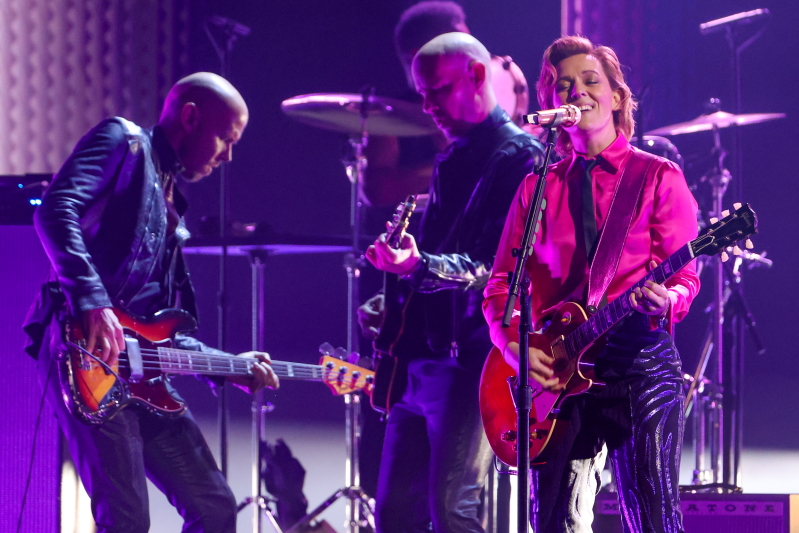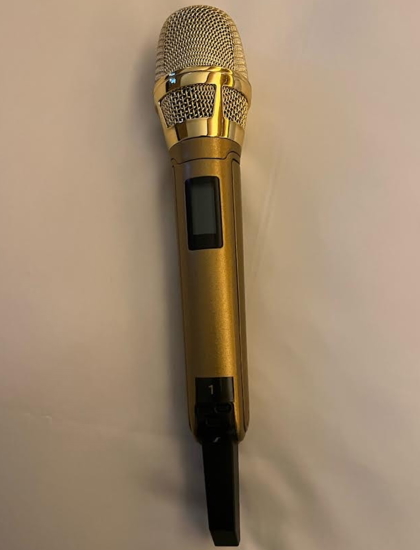Sennheiser Digital 6000 used at 65th GRAMMY Awards

Picture: Robert Gauthier / Los Angeles Times via Getty Images
The 12 million-plus U.S. viewers who tuned in to the 65th Annual GRAMMY Awards live broadcast from the Crypto.com Arena in Los Angeles on February 5 got to see history being made as long-time Sennheiser user Beyoncé celebrated her record-breaking 32nd GRAMMY Award with her fourth and final win of the night. Viewers were also treated to the sonic purity and ultra-reliable performance of Sennheiser’s Digital 6000 wireless microphone system on performances by Brandi Carlile - who picked up three GRAMMY Awards - and by legendary rappers Salt-N-Pepa, Rakim and Public Enemy’s Chuck D and Flavor Flav during the live, all-star grand finale commemorating 50 years of hip-hop.
The GRAMMY telecast kicked off with Sennheiser user Bad Bunny, who has been the most-streamed artist globally for the past three years straight and who picked up the award for Best Música Urbana Album. He was followed by Brandi Carlile, who rocked out her song “Broken Horses” with her custom gold Sennheiser SKM 6000 handheld transmitter / Neumann KK 205 condenser capsule combination and an assortment of Sennheiser evolution series wired background vocal and backline microphones. Carlile collected GRAMMYs for Best Rock Performance, Best Americana Album and Best Rock Song on the day. Rounding out the Sennheiser performances on the night was Steve Lacy, who won Progressive R&B Album of the Year.
In all, artists using Sennheiser microphones came away with 18 GRAMMY Awards this year, including Adele (Best Pop Solo Performance), Kendrick Lamar (Best Rap Performance), Future and Drake (Best Melodic Rap Performance), Molly Tuttle and Golden Highway (Best Bluegrass Album), Harry Styles (Best Engineered Album, Non-Classical) and, of course, Beyoncé, who took home the awards for Best Dance/Electronic Music Album, Best Dance/Electronic Recording, Best Traditional R&B Performance and Best R&B Song.
According to Sean Quackenbush, Carlile’s front-of-house engineer for the past eight years, the SKM 6000 / KK 205 combination has become a mainstay for the artist. “The Neumann KK 205 capsule is so high definition and gives you this hi-fi tone,” he says. “It works well with her; she has so much power behind her vocal. I really liked the idea of the Digital 6000 wireless with the Neumann capsule when it was introduced and, honestly, it has been a great solution over the years. We just work out whatever frequency band we will be in and it works seamlessly.”

Picture: Sean Quackenbush
To Carlile’s left and right on stage, the Hanseroth twins - guitarist Tim and bassist Phil - were also on SKM 6000 transmitters, topped with MMD 935 dynamic vocal mic capsules, for the GRAMMY performance. “We also had Lucius - Jess Wolfe and Holly Laessig - singing backgrounds for us using 935s on 6000 transmitters, to keep it uniform. We got one really great sound across the board for background mics,” Quackenbush says.
One highlight of Carlile’s stage sound is the guitar tones delivered by Sennheiser wired mics, he continues. “Tim, our lead guitarist, always gets a vintage gold Sennheiser MD 409, because the way the midrange works with his tone is just amazing,” he continues. “Then we have an e 906 for Brandi, because that mic works with her guitar tone. She does more of a straight-ahead, Malcolm Young rhythm part, and the two of them together just make the guitar sound sing so nicely. Most of what you hear on our guitars are the MD 409 and the 906. We always have that combo and it sounds great.”
Quackenbush also reports that he has been a loyal Sennheiser user for 20 years. “Sennheiser have always supported in me in whatever I do,” he says. “I am a major fan of the digital outputs on the EM 6000 receiver,” says Brandon Blackwell, Steve Lacy’s engineer, who has owned four channels of Digital 6000 since 2018. Both Lacy and bass player Thundercat were on the digital wireless system for the GRAMMY show performing Gemini Rights’ “Bad Habit”. “Steve’s microphone sounds more forward in the mix when using the digital outputs,” Blackwell reports. “There is also little to no noise floor, which is nice for the most important input in the mix.”
Blackwell prefers the MD 9235 in combination with Lacy’s SKM 6000: “I enjoy the MD 9235 because there is a high-end shelf in the frequency response that adds air and crispness to Steve’s vocal. With other capsules I find that when I boost the high-end frequencies it can sound unnatural. With the MD 9235 capsule, the high-end is already there so I like to control it with a dynamic equalizer or dynamic compressor. And the off-axis rejection really helped with feedback management while mixing monitors for Thundercat, who utilizes a stereo wedge mix. The MD 9235 does a great job of isolating the vocal and decreasing the amount of crowd noise and room reflections that enter the capsule.”
As for wired microphones, Blackwell says, “I decided to go away from my normal mic choices. Collaborating with the MD and drummer Rico Nichols, I was looking for a vintage sound on the drums, especially the toms, and decided that the MD 421-II would be the best choice to reproduce the vintage drum sounds of the 1960s and 1970s.”
Broadcast music mixers Eric Schilling and John Harris alternated between artists in the running order as they worked in their separate remote trucks (Schilling mixed Carlile; Harris mixed Lacy) but are in-sync when it comes to microphone choices. “We see Sennheiser mics used mostly on guitars, horns and drums,” says Schilling, “On horns we had the MD 421-II, which is also my go-to mic on saxes. They are just very reliable, and I know exactly what they are going to do.”
He adds, “If somebody is on a Sennheiser it is generally going to have a more open sound and I won’t have to EQ the midrange and top end. The 6000 gives me a very airy top end that I really like compared to a lot of other wireless mic systems.” Schilling won the GRAMMY for Best Immersive Audio Album earlier in the day for Stewart Copeland and Ricky Kej’s Divine Tides, which was mixed entirely on Neumann KH monitors alongside Herbert Waltl.
Schilling has mixed Carlile on three GRAMMY telecasts now, he continues. “What’s good about the Neumann KK 205 is that it sounds great whether she is singing softly or loudly. The capsule is a very good fit for her voice, and I didn’t have to struggle to find where I wanted to put her voice or the guitars in the balance.”
“The e 602 is an awesome mic; I love it,” Harris says. Like Schilling, he favors the 602 on kick drum, floor toms and tympani. “And anything that is meant to be a big sound that you want to really control, as well,” he says. “It makes the bottom end of drum sets come alive. I will use the 602 both inside and outside the drum. Inside, it gives you a nice smack. I know exactly what I am going to get with the 602.”
In his truck at the telecast, Harris monitored his mixes on Sennheiser HD 820 headphones. “I trust my HD 820s implicitly,” he says. “And in an environment like a truck, the closed-back design is perfect, because people come in and out of the room and it can be distracting. The HD 820s gives me the spacious sound but in a closed-back design so I can focus.”
Carlile also performed at the Recording Academy’s 2023 MusiCares Persons of the Year Gala at the Los Angeles Convention Center on February 3. “Brandi coming out with the great Phil Gaines’ house band doing ‘Tracks of My Tears’ with Barry Gordy and Smokey Robinson front and center literally brought the house down and sounded great,” Quackenbush reports.
“Each year, it is a privilege for us to provide support for such a wide range of talented artists on music’s biggest night,” commented Tim Moore, Relations Manager, Sennheiser. “At this year’s GRAMMY Awards, we are thrilled that our Digital 6000 wireless system, and the entire ecosystem of Sennheiser products, were the choice of so many accomplished and decorated artists.”
 How to resolve AdBlock issue?
How to resolve AdBlock issue?